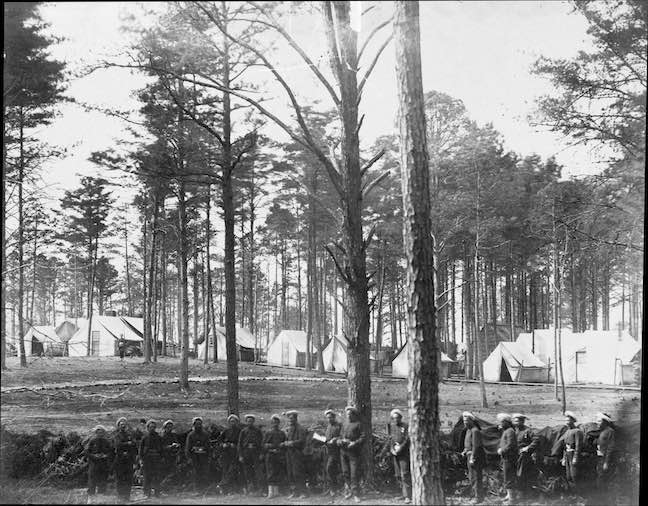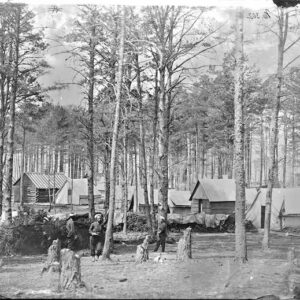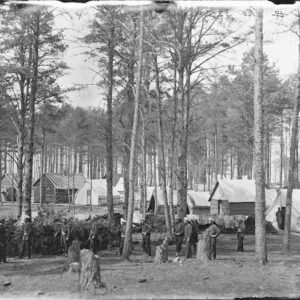| Credit: | by OSullivan (Timothy H.) |
|---|---|
| Date: | 1864.04 |
| Negative Size: | 8 in. x 10 in. |
| Equipment: | wall tent |
| Locations & Lines: | Brandy Station VA; Virginia |
| Military Units: | Army of the Potomac; US Army |
| Sources: | Library of Congress; National Archives |
$6.99
File Details: AILOm, 800 DPI, TIFF, Original Photograph, 42.4 Mb
Image ID: AILO
Gardners Photographic Sketch Book Of The War. Vol. 2, No. 60. Head-Quarters Army of the Potomac, Brandy Station, Virginia. February, 1864. This scene represents General Headquarters of the Army of the Potomac, at Brandy Station, just previous to the Wilderness campaign. The large tent was occupied by Gen. Meade, and the adjoining tent by his chief of staff, Gen. Humphreys. The telegraph office was situated immediately in rear of them. The tents of the staff formed a semi-circle in front of the Commanding Generals Headquarters, and are but partly shown in this sketch. The camp was enclosed with a neat brush fence, and footwalks of plank were laid down, connecting the officers quarters. Attached to headquarters were the offices of the Adjutant-General, the Chief Quartermaster, Chief Commissary and Provost Marshal General, the heads of the Engineer, Signal and Telegraph Corps, the Chief of Artillery, Medical Director, and the Stockade for Prisoners, forming a large camp, requiring two regiments for police and guard duty. In addition to these, there was a squadron of Cavalry for escort duty. Life in headquarters was always pleasant. In seasons of inactivity very little of the officers time was occupied by military matters, and the days passed like a dream. There were always visitors at headquarters, bands made music at all hours, and winter evenings slipped away, leaving only recollections too dear to be forgotten. Chess, whist, and the more popular game of poker filled up the hours that might otherwise have dragged heavily, and the huts and tents in the woods frequently became invested with charm like that of home. Every scouting party that returned from hazardous expeditions reported to headquarters. All the gossip of army life centered here, bringing in every rumor of movements in hostile camps, every whisper of jealousy among subordinates, and the details of entertainments in the field, where staff and regimental officers held high carnival. If a sentry miles away was shot at his lonely post in the night, his name came in on the current of official records to headquarters just the same as that of the Major General. This was the heart of the army, and the corps and divisions were but members that throbbed with its impulses. Precious are the memories of its bivouacs, and they who lived within its social circle, turn to the reminiscences of those days as among the brightest of their lives.
Zouaves.



